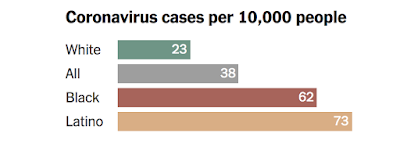One of the students in my Urban Colloquium class this past semester was sheltering-in-place at his home in Queens. He wrote this poem, which he gave me permission to share here anonymously.
Poem
As I sit safely in my home, my phone is filled with news and Go Fund Mes
The privilege of working remotely, still getting a check, and not feeling hungry
Who is really an essential worker and who is not?
How the hell is my neighborhood dying, yet still being harassed by the cops?
You “discipline” the dying, while handing masks to the living.
I saw the picture, you prefer shirtless white people sitting.
How is it that I keep track of this, yet feel paralyzed by the whole situation?
Trying to keep my family physically and mentally safe has kept me in isolation
Guilt lays over me and suffocates my character
Who am I? Why am I not helping? Don't all those falling matter?
Am I selfish?
Does being an activist leave room for this?
You said donating was not enough, and solidarity was the road to bliss.
I have fallen and let myself go
Not knowing how to reach out, I dive back into the computer, though my productivity is low.
Incomplete, I slump into the abyss.
Missing...
A part of me
I miss.
I fall
And continue to fall endlessly, until I am finally interrupted
Without any request, my body begins to resuscitate
Vibrations begin to fill my soul
Kids yelling, speakers blasting
It was Bad Bunny and Hector Lavoe
I slowly resuscitate
My neighborhood is living, it has never let me go
This poem captures that moment of despair that so many of us have felt -- what can we do that would be enough in the face of all that is happening? But then the poet is distracted by the vibrations that begin to fill his body -- "It was Bad Bunny and Hector Lavoe." As he listens, the burden lifts, is lifted by his neighborhood.
There is so much to listen to these days. Last night I listened to "
Why We Fight: Voices from the Struggle for Health Care Justice." Organized by Voices of a People's History and 400 Years of Inequality, the readings conveyed so many emotions, so many ideas. I resuscitated. The burden was lifted by the neighborhood of people who have struggled over centuries to win justice.
It might be Bad Bunny, it might be Dorothea Dix you need to listen to. What it is I don't know. I know that listening is part of how we heal, find the strength to keep going, resuscitate.

















